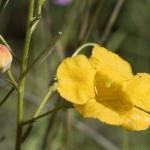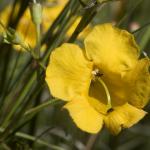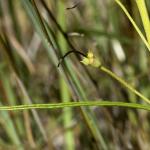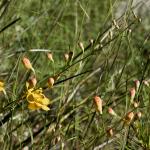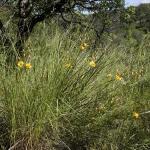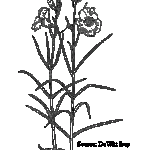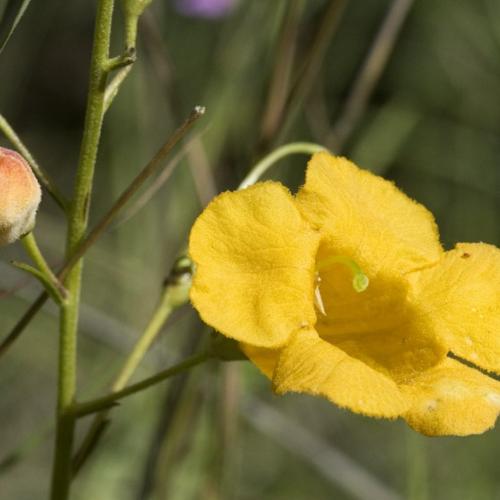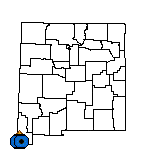Brachystigma wrightii (Wright's Foxglove)
GERARDIA WRIGHTII A. GRAY
Perennial herb, with large, woody caudex; herbage retrorsely hispidulous; stems several, simple or branched; leaves opposite or nearly so, or in whorls of 3, narrowly linear, entire, often revolute, midrib prominent on lower surface; inflorescence a loose, leafy raceme, pedicels often in whorls of three, 5-27 mm long in flower, 15-30 in fruit; flowers showy, brownish-yellow or orange-yellow, drying blackish; calyx puberulent, tube 3.5-5 mm, lobes triangular, 0.5-1.5 mm; corolla bilaterally symmetrical, 20-30 mm across, the tube short, scarcely surpassing the calyx, the throat large, ventricose, the lobes ciliate; anther filaments lanose for about half their length. Flowers mid-August to early October.
Its range, linear leaves, and yellow, inflated flowers make this plant distinctive.
New Mexico, Hidalgo County; Arizona, Cochise, Graham, Pima, Santa Cruz counties; adjacent Mexico, Chihuahua and Sonora.
Dry slopes, rocky mountain sides, and mesas, often among oaks; 1,520-2,290 m (5,000-7,500 ft).
This plant occurs in ten of the Sky Island mountain ranges of southeastern Arizona with the most collections from the Patagonia, Huachuca, and Chiricahua mountains. There are 62 specimens of this plant in Arizona herbaria; there are 8 specimens in New Mexico herbaria. Some specimens were collected as recently as 2002. The range extends into Chihuahua and Sonora, but the abundance in Mexico is not well documented in Arizona or New Mexico herbaria. The range of this species in the United States is from the Animas to the Atascosa mountains, a distance of about 145 miles. This plant appears to be fairly common across a range of greater than 100 miles so it does not qualify as rare under NMRPTC criteria.
Current land uses apparently pose no threat to this species.
Pennell, F.W. 1928. Agalinis and allies in North America. Proceedings of the Academy of Natural Sciences of Philadelphia 80:339-449.
For distribution maps and more information, visit Natural Heritage New Mexico

